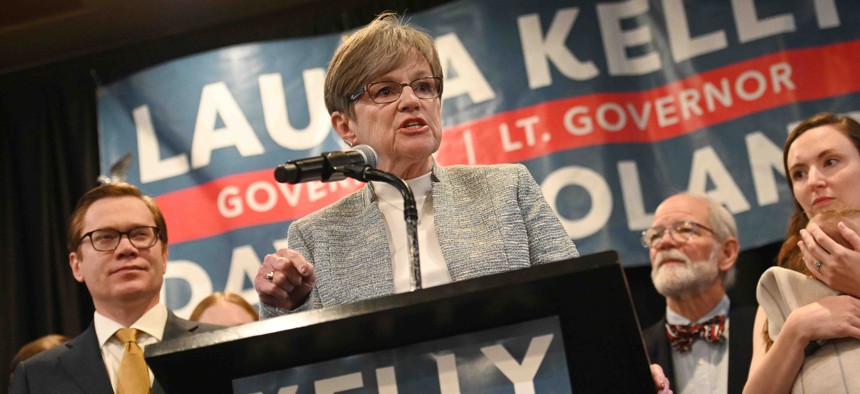Kansas' Democratic Governor Hangs on for Second Term

Incumbent Democratic Gov. Laura Kelly addresses the crowd during her watch party at the Ramada Hotel Downtown Topeka on November 8, 2022 in Topeka, Kansas. Michael B. Thomas/Getty Images
Laura Kelly edged out her GOP challenger in a closely watched race. Meanwhile, Republican Kris Kobach, a lightning rod figure during his time as Kansas' secretary of state, made a political comeback and will become the state's next AG.
In one of the nation's tightest races for governor, Democratic Kansas incumbent, Laura Kelly, declared victory on Wednesday against Republican Attorney General Derek Schmidt.
Meanwhile, Kris Kobach a controversial former Kansas secretary of state, who fanned fears about voter fraud during his time in that post, while pushing for tougher voter eligibility requirements, mounted a political comeback and will take Schmidt's place in the AG's office.
In the governor's race, Kelly was up by about 1.5 points, with around 49.2% of the vote to Schmidt's 47.7% as of midday. Kelly has presented herself as a moderate in a state that favors Republicans. The GOP controls both chambers of the Legislature by wide margins. And in the U.S. Senate race there, incumbent Republican Jerry Moran easily won, claiming about 60% of the vote.
"I spoke a lot in this campaign about my middle-of-the-road approach, because governing from the middle is important," Kelly said in a statement after her win. "Everyone is tired of hyper-partisanship."
The GOP Legislature will temper what Kelly can accomplish. But after her win she reiterated pledges to expand Medicaid and to speed up the phase out of a sales tax on food she signed into law earlier this year. She also promised to focus on expanding access to high-speed internet and strengthening early childhood education.
During the campaign, Schmidt criticized Kelly for policies she supported to prevent the spread of Covid, said he wanted to tighten state spending and had a proposal for a tax break aimed at getting more people to retire in Kansas.
In an August referendum, Kansas voters rejected a proposed amendment to the state constitution that would have lifted protections for abortion rights in the state in the wake of the U.S. Supreme Court decision overturning Roe v. Wade. But abortion was not as big an issue in the Kansas governor's race compared to other states.
Kansas still bears the scars from a messy tax cut experiment carried out under former GOP governor Sam Brownback that led to sharp cuts to schools, depleted savings and credit ratings downgrades. Kelly has highlighted her role in moving the state past those fiscal woes.
In the attorney general contest, Kobach had about 51.2% of the vote as of Wednesday afternoon. Democrat Chris Mann had 48.8%. Kobach served as Kansas secretary of state from 2011 to 2019, mounting an unsuccessful bid for governor against Kelly in 2018.
In 2017, then-President Donald Trump appointed Kobach vice chair of a Commission on Election Integrity. That panel was later disbanded without finding any evidence of the types of widespread voting fraud Trump claimed to be a problem.
Kobach—a Yale-trained lawyer, with a Ph.D. in politics from the University of Oxford and an undergrad degree from Harvard—has faced criticism over the years not only for supporting restrictive voting measures, but also for pushing laws targeting immigrants.
He promises to be a thorn in the side of the White House. With his win confirmed on Wednesday, he took to Twitter to highlight his priorities. "It's time to get to work tackling the fentanyl crisis and pushing back against the Biden Administration's illegal mandates," he said.
The Republican Attorneys General Association welcomed his election.
"AG-elect Kobach has been using his legal expertise to challenge the Biden Administration’s unconstitutional mandates regarding vaccine mandates, religious liberty, and illegal immigration," the group's executive director, Peter Bisbee, said in a statement. "This is exactly the type of experience that will bolster existing efforts by Republican AGs to defend the Constitution and rule of law.”
NEXT STORY: DeSantis Dominates in Winning Second Term






